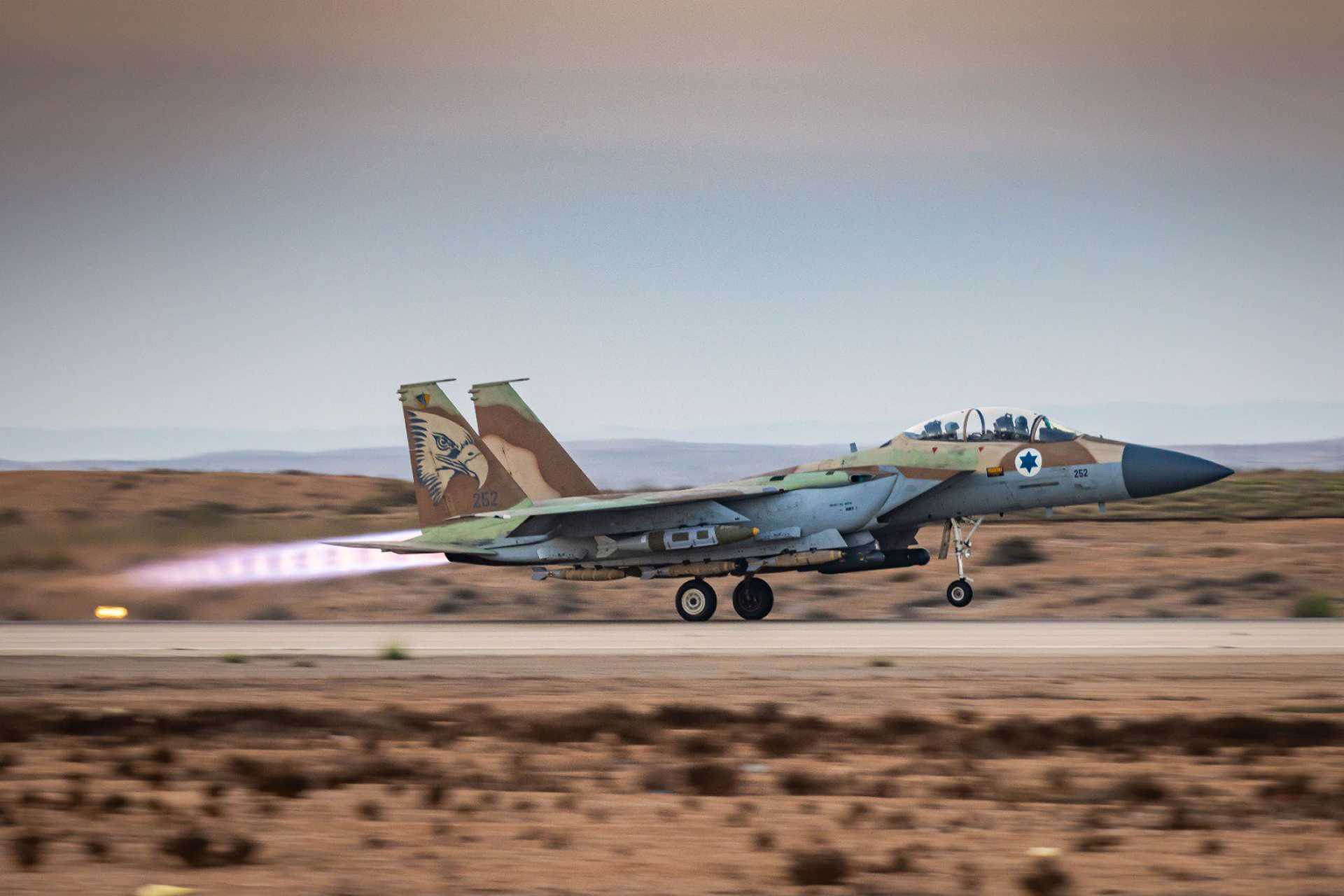US to significantly increase Israel’s strike capabilities with $6.75 billion worth of GPS-guided bombs

{loadposition bannertop}
{loadposition sidebarpub}
On February 7, 2025, the U.S. State Department approved a Foreign Military Sale to Israel, authorizing the transfer of munitions, guidance kits, fuzes, and associated support equipment valued at approximately $6.75 billion. The package includes GBU-39/B Small Diameter Bombs and JDAM kits, compatible with Israel’s F-15I, F-16I, and F-35I aircraft, bolstering its munitions stockpile and operational readiness. This deal follows a surge in U.S. Foreign Military Sales (FMS), which reached a record $318.7 billion in Fiscal Year 2024.Follow Army Recognition on Google News at this link
The Israeli Air Force (IAF) operates multiple fighter jets capable of deploying these munitions, including the F-15I Ra’am, F-16I Sufa, and F-35I Adir. (Picture source: Israeli MoD)
The proposed sale includes 2,166 GBU-39/B Small Diameter Bombs (SDB-I), 2,800 MK 82 500-pound general-purpose bomb bodies, and a significant quantity of Joint Direct Attack Munition (JDAM) guidance kits. The JDAM package consists of 13,000 units for MK-84 bomb bodies, 3,475 for BLU-109 bomb bodies, and 1,004 for GBU-38v1 configurations. Additionally, Israel will receive 17,475 FMU-152A/B fuzes, FMU-139 fuzes, bomb components, and logistics and program support. Deliveries are scheduled to begin in 2025.
The Israeli Air Force (IAF) operates multiple aircraft capable of deploying these munitions, including the F-15I Ra’am, F-16I Sufa, and F-35I Adir. The GBU-39/B Small Diameter Bomb (SDB-I) is a 250-pound precision-guided munition designed for accurate strikes with reduced collateral effects. Its compact size allows aircraft to carry multiple units per sortie, increasing target engagement per mission. The bomb utilizes GPS guidance for all-weather accuracy.
The MK 82 General Purpose Bomb is a 500-pound unguided munition widely used in air-to-ground operations. When fitted with JDAM (Joint Direct Attack Munition) guidance kits, it becomes a precision-guided bomb capable of engaging stationary and moving targets. JDAM kits convert unguided bombs such as the MK 82, MK 84, and BLU-109 into GPS-guided munitions, enhancing accuracy under varying weather conditions.
The FMU-152A/B and FMU-139 fuzes provide programmable detonation options, including airburst, impact, and delayed explosion, depending on operational requirements. These fuzes offer adaptability for engaging different target types, such as hardened structures or open-area threats.
Since its establishment in 1948, Israel has been a strategic U.S. partner. Its location in the Middle East provides the U.S. with a strategic presence in a region critical for global energy security and geopolitical stability. Militarily, Israel possesses advanced defense capabilities, supported by U.S. military aid and joint technology development, including missile defense systems. Intelligence-sharing agreements between the two nations have bolstered counterterrorism efforts and regional security initiatives. The U.S.-Israel Free Trade Agreement (1985) has further strengthened economic ties, particularly in the defense and high-tech sectors.
Since the October 2023 conflict with Hamas, U.S.-Israel defense cooperation has intensified, with the United States providing substantial military aid and arms sales, including hundreds of Joint Light Tactical Vehicles (JLTVs), designated locally as “Para.” At least $12.5 billion in direct military assistance has been allocated through legislative measures, including $3.8 billion from a March 2024 bill and $8.7 billion from an April 2024 supplemental appropriations act. Significant arms deals have also been executed, including a $660 million sale of Hellfire missiles, reinforcing Israel’s defense capabilities amid sustained regional tensions.
This approval comes amid a broader surge in U.S. Foreign Military Sales (FMS). In Fiscal Year 2023, FMS transactions hit a record $80.9 billion, with Fiscal Year 2024 surpassing this, as U.S. military equipment sales to foreign governments rose 29%, reaching $318.7 billion. This growth is driven largely by global efforts to replenish defense stocks depleted by aid to Ukraine and prepare for potential conflicts. Major U.S. defense contractors, such as Lockheed Martin, General Dynamics, and Northrop Grumman, have played a pivotal role in fulfilling these contracts.
However, in January 2025, President Donald Trump issued Executive Order 14169, titled “Reevaluating and Realigning United States Foreign Aid.” This order imposed a 90-day pause on all U.S. foreign development assistance programs to review their alignment with American interests and values. The suspension affected various aid initiatives, including health services, education, and emergency projects, with exceptions limited to emergency food assistance and military aid for key allies, including Israel.

{loadposition bannertop}
{loadposition sidebarpub}
On February 7, 2025, the U.S. State Department approved a Foreign Military Sale to Israel, authorizing the transfer of munitions, guidance kits, fuzes, and associated support equipment valued at approximately $6.75 billion. The package includes GBU-39/B Small Diameter Bombs and JDAM kits, compatible with Israel’s F-15I, F-16I, and F-35I aircraft, bolstering its munitions stockpile and operational readiness. This deal follows a surge in U.S. Foreign Military Sales (FMS), which reached a record $318.7 billion in Fiscal Year 2024.
Follow Army Recognition on Google News at this link
The Israeli Air Force (IAF) operates multiple fighter jets capable of deploying these munitions, including the F-15I Ra’am, F-16I Sufa, and F-35I Adir. (Picture source: Israeli MoD)
The proposed sale includes 2,166 GBU-39/B Small Diameter Bombs (SDB-I), 2,800 MK 82 500-pound general-purpose bomb bodies, and a significant quantity of Joint Direct Attack Munition (JDAM) guidance kits. The JDAM package consists of 13,000 units for MK-84 bomb bodies, 3,475 for BLU-109 bomb bodies, and 1,004 for GBU-38v1 configurations. Additionally, Israel will receive 17,475 FMU-152A/B fuzes, FMU-139 fuzes, bomb components, and logistics and program support. Deliveries are scheduled to begin in 2025.
The Israeli Air Force (IAF) operates multiple aircraft capable of deploying these munitions, including the F-15I Ra’am, F-16I Sufa, and F-35I Adir. The GBU-39/B Small Diameter Bomb (SDB-I) is a 250-pound precision-guided munition designed for accurate strikes with reduced collateral effects. Its compact size allows aircraft to carry multiple units per sortie, increasing target engagement per mission. The bomb utilizes GPS guidance for all-weather accuracy.
The MK 82 General Purpose Bomb is a 500-pound unguided munition widely used in air-to-ground operations. When fitted with JDAM (Joint Direct Attack Munition) guidance kits, it becomes a precision-guided bomb capable of engaging stationary and moving targets. JDAM kits convert unguided bombs such as the MK 82, MK 84, and BLU-109 into GPS-guided munitions, enhancing accuracy under varying weather conditions.
The FMU-152A/B and FMU-139 fuzes provide programmable detonation options, including airburst, impact, and delayed explosion, depending on operational requirements. These fuzes offer adaptability for engaging different target types, such as hardened structures or open-area threats.
Since its establishment in 1948, Israel has been a strategic U.S. partner. Its location in the Middle East provides the U.S. with a strategic presence in a region critical for global energy security and geopolitical stability. Militarily, Israel possesses advanced defense capabilities, supported by U.S. military aid and joint technology development, including missile defense systems. Intelligence-sharing agreements between the two nations have bolstered counterterrorism efforts and regional security initiatives. The U.S.-Israel Free Trade Agreement (1985) has further strengthened economic ties, particularly in the defense and high-tech sectors.
Since the October 2023 conflict with Hamas, U.S.-Israel defense cooperation has intensified, with the United States providing substantial military aid and arms sales, including hundreds of Joint Light Tactical Vehicles (JLTVs), designated locally as “Para.” At least $12.5 billion in direct military assistance has been allocated through legislative measures, including $3.8 billion from a March 2024 bill and $8.7 billion from an April 2024 supplemental appropriations act. Significant arms deals have also been executed, including a $660 million sale of Hellfire missiles, reinforcing Israel’s defense capabilities amid sustained regional tensions.
This approval comes amid a broader surge in U.S. Foreign Military Sales (FMS). In Fiscal Year 2023, FMS transactions hit a record $80.9 billion, with Fiscal Year 2024 surpassing this, as U.S. military equipment sales to foreign governments rose 29%, reaching $318.7 billion. This growth is driven largely by global efforts to replenish defense stocks depleted by aid to Ukraine and prepare for potential conflicts. Major U.S. defense contractors, such as Lockheed Martin, General Dynamics, and Northrop Grumman, have played a pivotal role in fulfilling these contracts.
However, in January 2025, President Donald Trump issued Executive Order 14169, titled “Reevaluating and Realigning United States Foreign Aid.” This order imposed a 90-day pause on all U.S. foreign development assistance programs to review their alignment with American interests and values. The suspension affected various aid initiatives, including health services, education, and emergency projects, with exceptions limited to emergency food assistance and military aid for key allies, including Israel.





